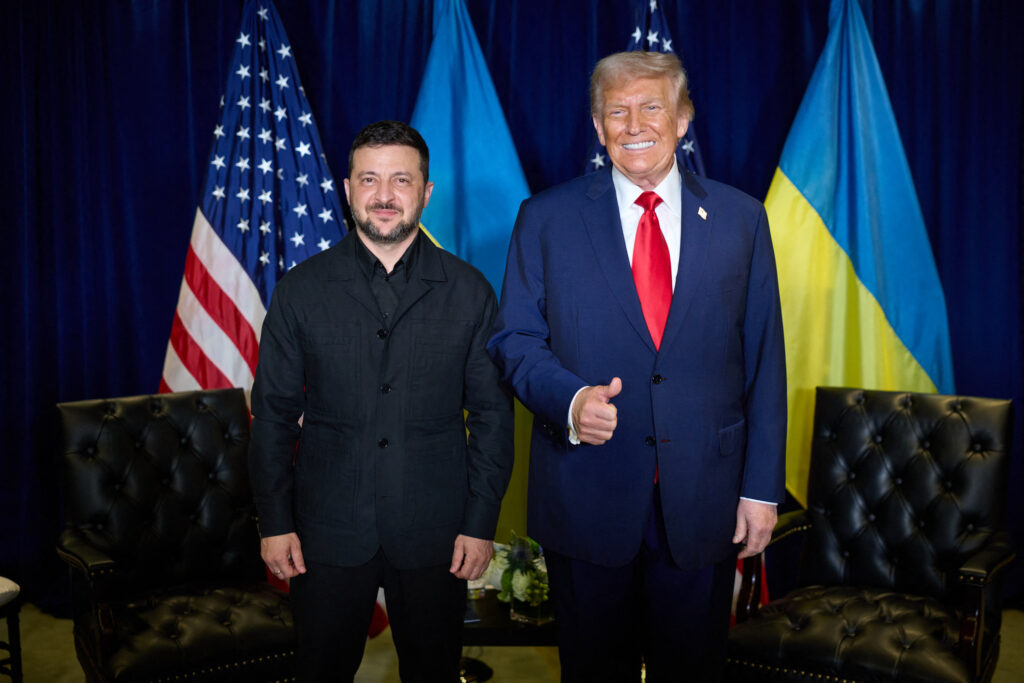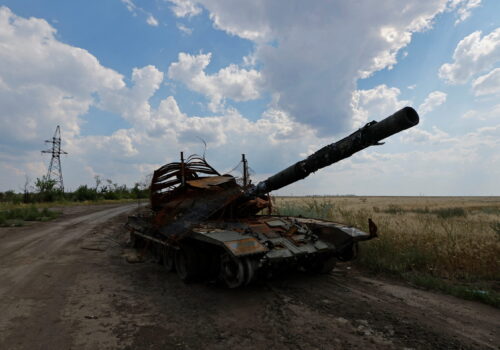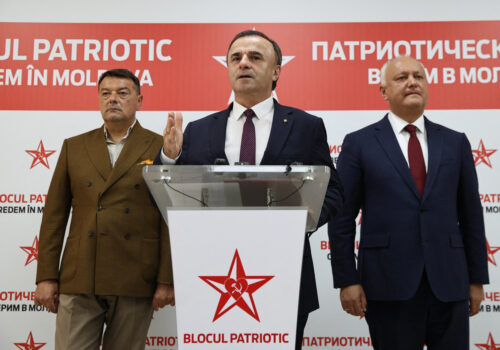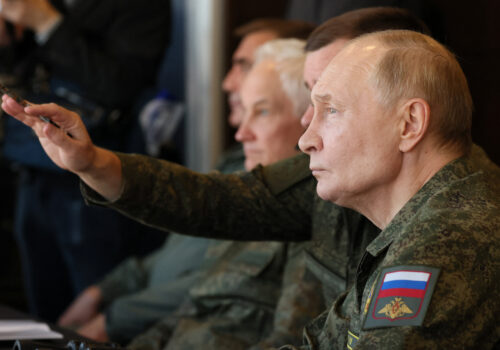US President Donald Trump made headlines this week with a social media post that suggested a dramatic shift in his position on the Russia-Ukraine War. After months of insisting that Ukrainian President Volodymyr Zelenskyy “doesn’t have the cards” and must “make a deal” involving sweeping concessions to the Kremlin, Trump suddenly declared on September 23 that Ukraine was now “in a position to fight and win all of Ukraine back in its original form.”
Much of Trump’s post focused on taunting Putin over his faltering invasion. In characteristically abrasive language, the US leader mocked the Russian army’s lack of progress in Ukraine and suggested Moscow was facing major economic problems due to the spiraling cost of the war. “Russia has been fighting aimlessly for three and a half years a war that should have taken a real military power less than a week to win,” Trump wrote. “This is not distinguishing Russia. In fact, it is very much making them look like a paper tiger.”
Many commentators chose to leap on Trump’s statement as proof of a major change in US policy toward Ukraine. In fact, the post contained nothing that suggested a new approach to relations between Washington and Kyiv. On the contrary, Trump stressed that it would now now be up to Europe to take the lead in supporting Ukraine.
While the US President repeatedly asserted that Ukraine could defeat Russia, there was no indication that America was ready to increase its support for the Ukrainian war effort or expand sanctions against Moscow. Instead, Trump limited himself to confirming that the US will continue to sell weapons to Ukraine via NATO partners. In other words, the Trump administration’s stance on the war is set to remain largely unchanged. However, instead of pressing Ukraine to accept a Kremlin-friendly peace deal, Trump is now openly talking about Ukrainian victory.
Stay updated
As the world watches the Russian invasion of Ukraine unfold, UkraineAlert delivers the best Atlantic Council expert insight and analysis on Ukraine twice a week directly to your inbox.
What caused President Trump’s rather radical change in tone? Putin’s relentless stalling tactics and his shameless backtracking have no doubt played a role, exhausting the US leader’s patience and making him look foolish for touting their alleged personal friendship. Trump himself has suggested that his new assessment of the war is based on a detailed understanding of the current military and economic situation in Russia and Ukraine. This version has been endorsed by US Vice President JD Vance, who commented this week that Trump has “grown very confident this war is bad for Russia.”
It is not difficult to imagine how intelligence briefings on the current state of the war in Ukraine might have convinced Trump to revise his earlier assumptions regarding Russia’s economic and military might. Putin’s recent summer offensive was billed as a potential turning point in the war but has clearly failed to achieve its objectives. Russian troops were unable to secure any major breakthroughs during the summer months and have made little progress toward the establishment of a border buffer zone in northern Ukraine. This underwhelming outcome was entirely in line with broader battlefield trends that have seen Russia forces seize less than one percent of Ukrainian territory over the past three years.
Russia’s modest gains have come at a terrible price. While neither Moscow nor Kyiv release official casualty figures, independent research based on open source data and intelligence reports indicate that hundreds of thousands of Russian soldiers have been killed in Ukraine, with even greater numbers wounded. This dwarfs the losses suffered in all the wars waged by the Kremlin since World War II.
In order to replenish the depleted ranks of his army, Putin has been forced to offer ever-larger bounties to new recruits. Nevertheless, the catastrophic casualty rate in Ukraine means that even the present steady flow of Russian volunteers may not be enough to sustain the invasion. In an indication of Moscow’s mounting manpower challenges, Putin brokered a deal with Pyongyang last year that saw more than ten thousand North Korean soldiers deployed to fight alongside the Russian army.
Putin is also visibly in struggling in the wider geopolitical arena. With the vast majority of Russia’s military resources already committed to the invasion of Ukraine, the Kremlin has found itself unable to project strength elsewhere. Russia could do nothing when the simmering war between Azerbaijan and Armenia flared up in 2023, and has since been largely excluded from the peace process between the two countries, leaving centuries of Russian imperial influence in doubt. Similarly, when the regime of Kremlin client Bashar al-Assad was under threat in late 2024, Moscow was unable to intervene to save the Syrian dictator. Iranian officials encountered the same toothless response more recently when they appealed to their Russian allies for help during Israel’s brief air war against the country.
As Russia’s international influence declines, Putin is facing growing economic woes on the home front. These problems are being compounded by an escalating Ukrainian bombing campaign targeting the Russian oil and gas industry. Since the beginning of August, Ukraine has launched dozens of airstrikes against Russian refineries, pipelines, pumping stations, and ports. This Ukrainian aerial offensive has dealt the biggest blow to the Russian economy since the start of the war, Reuters reports, with refining capacity significantly curtailed and energy exports down. Crucially, Ukrainian attacks have sparked a worsening fuel crisis in regions across Russia, with long queues forming at gas stations amid supply breakdowns and record price hikes.
Russia’s inability to defend its economically vital energy industry against Ukrainian long-range drones has highlighted just how overstretched the country’s military currently is. With the army’s limited supply of air defense systems deployed to the front lines in Ukraine or guarding major Russian cities along with the palaces of Putin and his cronies, there is simply not enough spare capacity to protect the vast oil and gas infrastructure that serves as the engine of Putin’s war machine.
This does not bode well for the Kremlin. Ukraine is clearly intent on methodically destroying Russia’s energy industry and is developing its own domestically produced cruise missiles to do so. If these weapons become more readily available in the coming months as anticipated, Kyiv’s capacity to strike targets deep inside Russia will be drastically enhanced.
Eurasia Center events

The unfavorable current military and economic outlook helps to explain why Trump chose to brand Russia a “paper tiger.” The jibe seems to have struck a nerve among Russians, many of whom are no doubt already beginning to feel uneasy about the worsening domestic situation and their army’s lack of progress in Ukraine. Pro-war bloggers and Kremlin pundits lined up to attack Trump and ridicule his “paper tiger” assertion, while Putin’s spokesman Dmitry Peskov felt obliged to directly address the insult. “Russia is by no means a tiger. Russia is traditionally seen as a bear. There is no such thing as paper bears. Russia is a real bear,” he somewhat bizarrely insisted during a radio interview.
Putin has so far remained silent but is likely to be seething. The Kremlin dictator is well known for his gangster-like obsession with respect, and has made no secret of his bitter resentment over Russia’s humiliating loss of superpower status following the collapse of the Soviet Union. Putin was said to have been deeply offended when US President Barack Obama dismissed Russia as a mere “regional power” in 2014 during the initial stages of Moscow’s attack on Ukraine. He will now also be haunted by Trump’s “paper tiger” taunt, which strikes at the very heart of his imperial insecurities.
The invasion of Ukraine was conceived by Putin as a decisive step to reverse the injustice of the Soviet breakup and revive the Russian Empire. He had hoped for a rapid victory that would transform the wider geopolitical landscape and return Russia to its rightful place among the world’s great powers. Instead, the war has ruthlessly exposed the limitations of the Russian military.
Today, Putin’s armies remain bogged down in brutal fighting for control over villages that lie within walking distance of the original front lines when Russia’s invasion first began more than three and a half years ago. At sea, Russia’s blockade of Ukraine’s Black Sea ports has been broken, with the bulk of Putin’s fleet forced to retreat from Crimea. Despite possessing one of the world’s largest air forces, Russia has been unable to secure air superiority in Ukraine and cannot even prevent the Ukrainians from striking targets deep inside the Russian Federation itself.
In light of this poor performance, it is hardly surprising that Russia’s military reputation has taken such a battering since 2022. Putin still possesses a vast and powerful war machine that is capable of inflicting untold harm and misery, but few would now classify Russia as a global superpower. Trump’s “paper tiger” barb was meant as an insult, but it may be closer to the truth that Putin’s pretensions to great power status.
Peter Dickinson is editor of the Atlantic Council’s UkraineAlert service.
Further reading
The views expressed in UkraineAlert are solely those of the authors and do not necessarily reflect the views of the Atlantic Council, its staff, or its supporters.

The Eurasia Center’s mission is to enhance transatlantic cooperation in promoting stability, democratic values, and prosperity in Eurasia, from Eastern Europe and Turkey in the West to the Caucasus, Russia, and Central Asia in the East.
Follow us on social media
and support our work
Image: Ukrainian President Volodymyr Zelenskyy meets with US President Donald Trump on the sidelines of the United Nations General Assembly in New York, on Tuesday, September 23, 2025. (Photo via Ukrainian Presidential Press Office/ABACAPRESS.COM)




